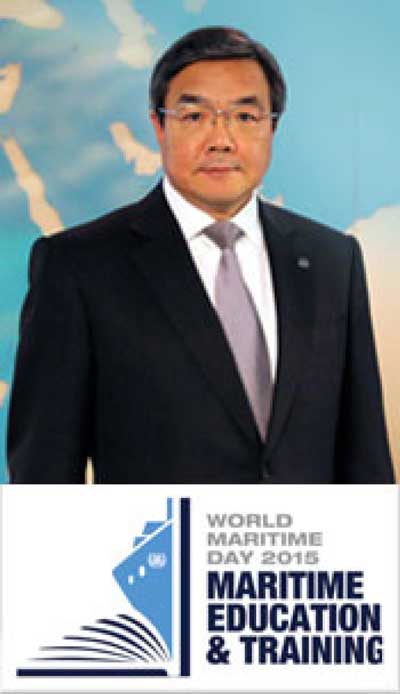Monday Feb 23, 2026
Monday Feb 23, 2026
Thursday, 24 September 2015 00:00 - - {{hitsCtrl.values.hits}}

Shipping is vitally important to the global community, playing a key role in sustainable development. The world depends on a safe, secure and efficient shipping industry; and, in turn, the shipping industry is dependent on an adequate supply of seafarers to operate the ships that carry the essential cargoes we all rely on.
But this supply of manpower is by no means guaranteed. Shipping is a highly technical industry, demanding considerable skill, knowledge and expertise from those who work in it. And it is impossible to learn all that on the job.
As a truly international industry, shipping needs a global network of specialist education and training establishments to ensure a continuing stream of high-calibre recruits.
Effective standards of training are the bedrock of a safe and secure shipping industry, and that is why this year, we have chosen to focus on “Maritime Education and Training” as our theme for World Maritime Day.
If the global fleet increases in size by 70% between now and 2030, the current number of 500,000 officers may need to be increased to 850,000.
Factoring in retirement among the existing workforce, that equates to an annual training requirement for officers in the order of some 40,000 per annum.
This is a major challenge. Further effort must be made to bring new generations into seafaring as a profession. Seafaring must be seen to appeal to new generations as a rewarding and fulfilling career.
Maritime education and training must be of high and consistent quality, throughout the world. It must be skills-based, competence-based and utilise the latest technology – such as simulators reflecting modern ships and up-to-date bridge layouts, for example.
But maritime education and training is not just for seafarers. Like the industry, maritime education needs broad coverage. Naval architecture, marine engineering, maritime law and many other fields all require specialist training.
IMO has a long and wide-ranging involvement in the human element of shipping. Maritime education and training are central to its work in this area.
The 1978 International Convention on Standards of Training, Certification and Watchkeeping for Seafarers (STCW Convention) and Code, as amended, has set the international benchmark for the training and education of seafarers. Compliance with its standards is essential for serving on board ships.
But the skills and competence of seafarers, and the human element ashore, can only be adequately underpinned, updated and maintained through effective maritime education and training.
Significant amendments to the 1978 STCW Convention and Code were adopted in 2010. Yet much remains to be done by Parties to ensure effective implementation before the end of the transition period on 1 January 2017.
Looking at the wider spectrum, IMO’s Integrated Technical Cooperation Programme (ITCP) provides a capacity-building framework to assist developing countries to
enhance the skills and proficiencies needed for effective compliance with IMO conventions and instruments.
The ITCP embodies the multi-layered nature of maritime education and training, through skills-based training events and the sharing of technical knowledge typically based on IMO Model Courses.
This, complemented by IMO’s global maritime training institutions the World Maritime University (WMU) and the IMO International Maritime Law Institute (IMLI), helps maintain a flow of high-level managers, policy-makers and other key personnel.
IMO is unique among UN agencies to have two affiliated educational institutions – the World Maritime University and the International Maritime Law Institute. We are very proud of these and of the many graduates they have produced who now hold positions of responsibility and influence within the maritime community.
Both remain at the forefront of the IMO’s capacity-building strategy, underpinning global standards and quality of maritime training.
Looking ahead, the human element in shipping will be seen as increasingly important, not just for the commercial success of shipping companies but also as the industry moves towards ever higher standards of safety, environmental impact and sustainability. It is the human element that will translate the new objectives in this area into solid actions.
It is impossible to overstress how important an issue this is. Without a quality labour force, motivated, trained and skilled to the appropriate international standards, shipping cannot thrive. Not only that, all the many advances that have been made, in terms of safety and environmental impact, are at risk if personnel within the industry are unable to implement them properly.
All of which makes the importance of training and education for the maritime personnel of today and tomorrow greater than ever before. IMO’s World Maritime Day theme for 2015 is a recognition of this growing importance.
All of which makes the importance of training and education for the maritime personnel of today and tomorrow greater than ever before. And it is in recognition of this growing importance that IMO has selected “Maritime Education and Training” as the theme for this year’s World Maritime Day.
In conclusion, let me congratulate the Government of Sri Lanka and, in particular, the Ministry of Ports, Shipping for organi sing this meeting to discuss issues surrounding the theme and how it can best be addressed in your country. I understand this is the first such event to be held in Sri Lanka and I wish you every success in what I am sure will be a worthwhile and fruitful event.